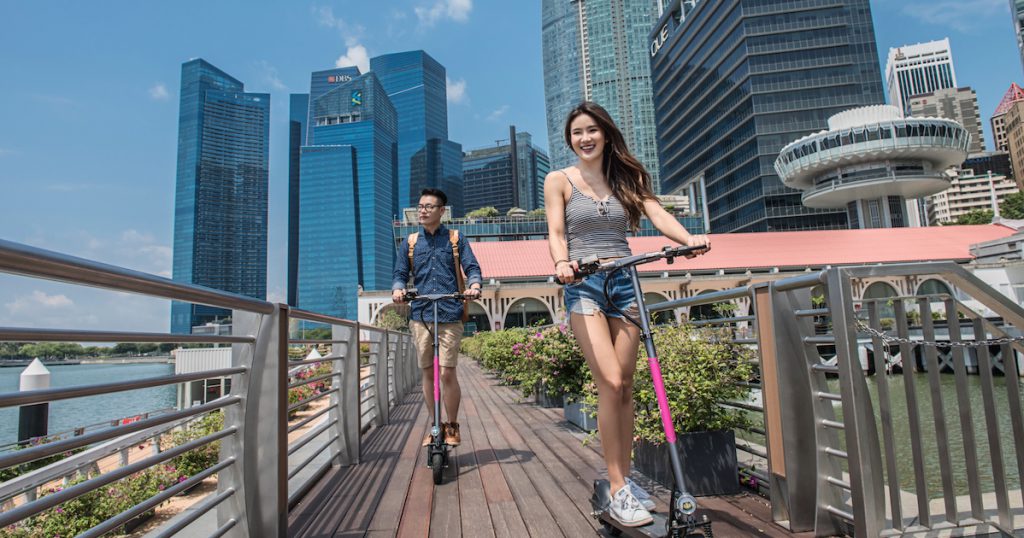Riding bicycles are sure fun, but it can get very tiring pedalling your way around – especially when you ride using the shared bikes, which aren’t exactly lightweight or have any gears to accommodate the different speeds.
So when e-scooter sharing was first introduced here, Singaporeans welcomed the idea with open arms.
Two home-grown firms have begun offering shared e-scooter services two months ago – first there’s Telepod, then came Neuron Mobility.
And now, a third player has joined the fray – and it’s planning to roll out its e-scooters at almost 30 locations islandwide.
This is a very aggressive launch, considering that the two other existing players started out small.

PopScoot said that it will officially launch in September.
But they are having a soft launch now whereby pilot decks will be deployed at ManuLife Centre, Republic Plaza, Tiong Bahru Plaza and City Square Mall.
Telepod, which shelved plans to launch the service in Punggol, has about 20 e-scooters at 7 locations islandwide now.
On the other hand, Neuron Mobility – which recently started a shared e-scooter and bicycle trial at Singapore Science Park 1 – has partnered with Park Regis Hotel to offer eight e-scooters for rent to hotel guests.
The startup is planning to have 100 scooters spread across 10 to 15 more stations in the CBD soon.
Good Response From Singaporeans
The uptake of e-scooter sharing has proved to be fairly good so far, despite a significantly higher pricing than the shared bikes.
To date, both Telepod and Neuron Mobility have about 2,000 registered users.
Neuron’s e-scooters cost 50 cents per 15 minutes ($2 for an hour), while Telepod’s e-scooters cost $1 for 10 minutes ($6 an hour). PopScoot’s e-scooters will cost $2 for 30 minutes, with a grace period of 10 minutes charged free for every ride.
For comparison sake, an ofo bicycle costs only $1 an hour.
But as opposed to bicycles, e-scooters are much faster and are less labour-intensive, so you hardly have to break a sweat as you zip around town.

And contrary to popular belief, e-scooters have a very low learning curve.
“For someone riding for the first time, the learning curve to ride an electric scooter is considerably easy. An average person should be able to ride the scooters almost right away, with some familiarisation,” PopScoot said on its website.
It is also relatively safe to ride as e-scooters are banned on roads.
They are only legally allowed on footpaths at the top speed of 15 km/h or cycling paths at 25km/h.
Failure to comply will result in a fine up to $5000, jail up to 6 months, or both.
No Abused E-Scooters So Far
While news of vandalised or damaged shared bicycles are widespread on the news in recent months, there’s been no such abuse cases for e-scooters so far.
E-scooter companies said they have a system in place that allows them to track missing e-scooters.
For instance, since Telepod’s e-scooters do not have docking stations, they must be returned to specific parking areas. And they are able to track their scooters in real-time so onced moved, they will be alerted.
For PopScoot, it uses a Bluetooth app-based unlocking system so e-scooters are released from their docks instantaneously when activated via mobile phones.
“PopScoot will roll out a primarily docked system for a start, which will address indiscriminate parking. In terms of deterring vandalism, there is a deposit that will go some way to mitigate the problem,” said Kelvin Emmanual Ng, Chief Marketing Officer of PopScoot.
“This combined with a GPS system and the dedicated docking will mean we can track down and prosecute any perpetrators in most cases.”
The in-app GPS provides the ability to locate available scooters islandwide and track the traveling route of the users. As a location-based mobile solution, it is also able to turn docking locations into data hotspots in the future.
Ng also said that the startup is looking to organise community events and campaigns to educate and endear Singaporeans to PopScoot.
“So far, we are encouraged by the lack of or minimal reports on abuse of e-scooters. We believe e-scooters do occupy a different space in the mind of the public – and their perception of its value, scarcity, coupled with its physical weight will veer them away from having a ‘throwaway’ mentality they may have for bicycles.”
Moving Towards A Car-Lite City

In line with the support of a sustainable environment, PopScoot offers an affordable and convenient transit solution that reduces road congestion by encouraging car-lite cities.
The Government has also continued to push towards its car-lite vision through initiatives such as the National Cycling Plan and the upgrading of supporting infrastructure.
These developments have driven up the popularity of Personal Mobility Devices (PMD) such as e-scooters and opened up vast market opportunities for e-scooting co-share services.
“Electric-scooters on-demand is the way forward for Singapore, due to its technologically-savvy population, compact urban layout and pro-car-lite Government,” said Ng.
“Our launch in September will be a major first step towards our goal of making e-scooter sharing mainstream in Singapore by making every journey affordable, convenient and enjoyable. We hope to work with investors and partners to transform the last mile commute scene in Singapore and other smart cities around the world.”
Featured Image Credit: PopScoot










